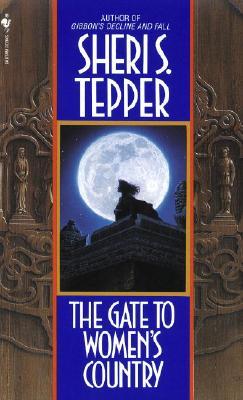“The Gate to Women’s Country” by Sheri Tepper

Yet another of the books my husband G has recommended that I’ve put off for a long time is The Gate to Women’s Country by Sheri Tepper. What moved it off the shelf was reading Patricia Weaver Francisco’s excellent Telling, a memoir of Rape and Recovery, which got me thinking about rape, and rape culture, and how fed up I am with Violence Against Women as a staple of media entertainment.
I freely admit, G. was right. This was a terrific book, a compelling read with strong women characters, interesting philosophy, good men, bad men, and a nice plot twist at the end which I didn’t see coming but made perfect sense when it did.
Women’s Country is a gated community. Warrior men live outside and protect the gates. They’re let in twice a year to drink and have sex at carnival. Any boy children that result are taken to the garrison at 5, but allowed to return to Women’s Country at when they’re older if they choose. Most don’t. Outside of the women’s cities there are swaths of wasteland, and a creepy religious community.
What I loved about this book was the main character Stavia and her mother, and the details of what a post-nuclear world and establishment of matriarchy would look like. The creation of this admittedly reductive, sexist future world highlights the ongoing sexist struggle that’s shown in the repetitive representation in popular media of violence against women, as well as its continuing reality.
Less successful for me was the interspersing of a community drama of ghosts after the Trojan war, which is supposed to be satire, but doesn’t always read as such, some of which is the point, but other parts of which didn’t jive for me.
(ghost of)ACHILLES: How can I force obedience on this? In other times I’ve used the fear of death to make a woman bow herself to me. If not the fear of her own death, then fear for someone else, a husband or a child. How can I bend this woman to my will?
(ghost of)POLYXENA: I think I will not bend.
IPHIGENIA: You see, it’s as we’ve tried to tell you, Great Achilles. Women are no good to you dead.
What didn’t work, and was especially troubling to me, was the quick dismissal of homosexuality as simply genetic, and something to be “corrected” in vitro. Yikes. Everyone was male or female and supposed to be heterosexual. Reducing these complex realities, and dismissing the complex people they represent from the real world, is a major disappointment in an otherwise stirring work, and dates it.